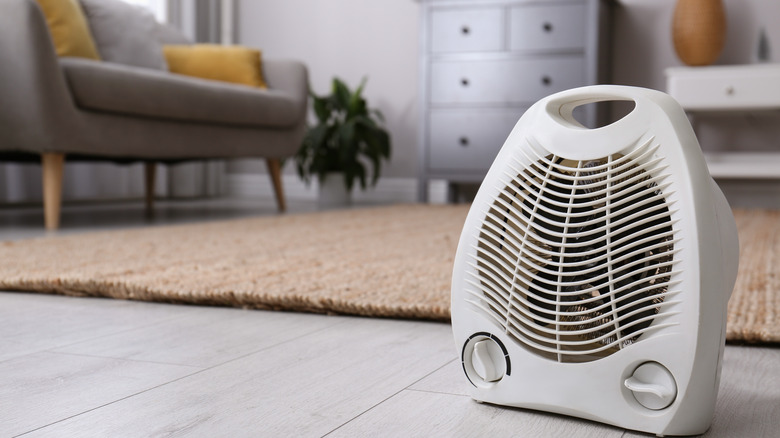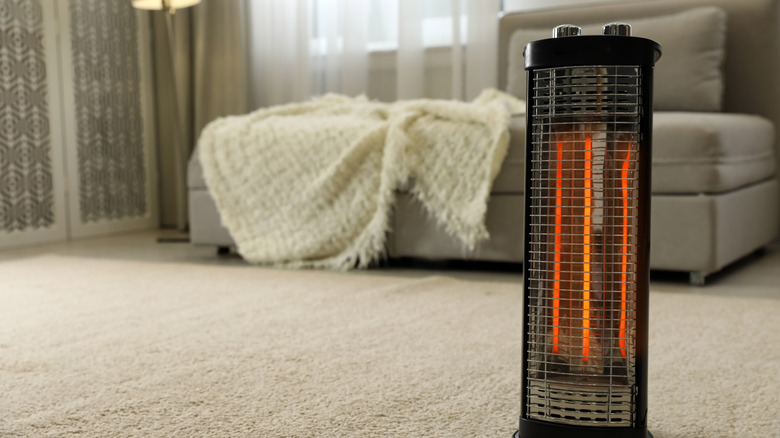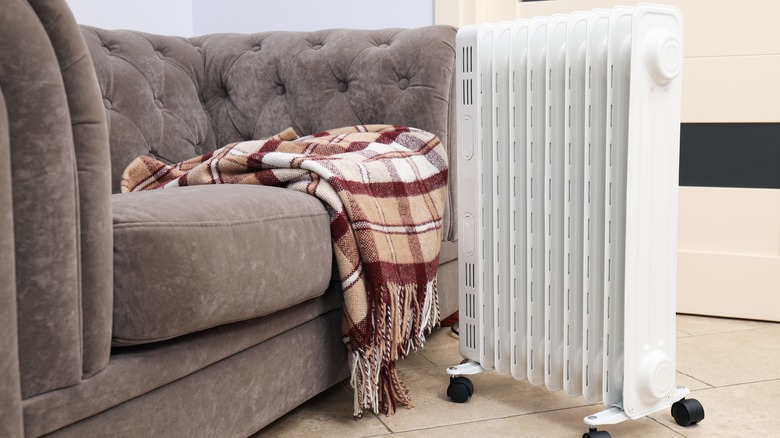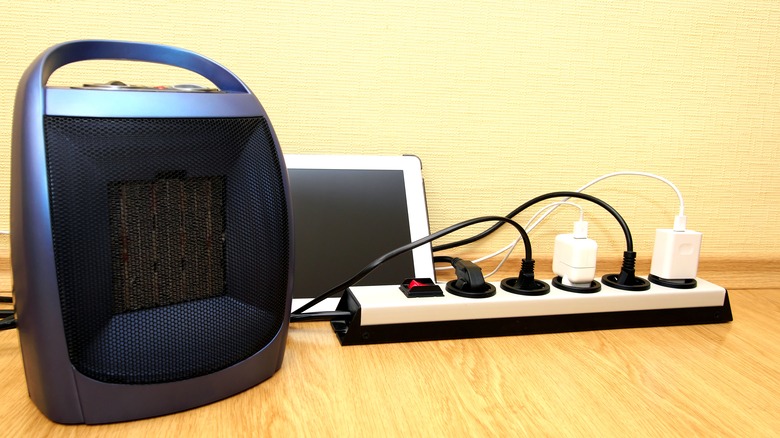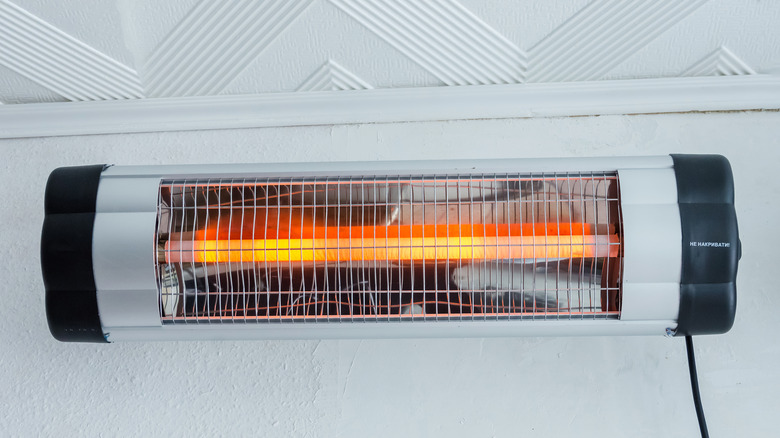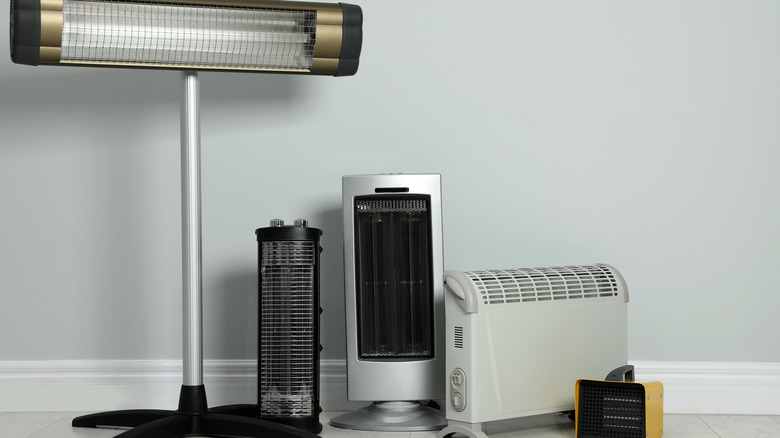5 Mistakes To Avoid When Using A Space Heater
When winter kicks in and the temperature drops dramatically, every homeowner looks for a heating solution that will also be easy on the energy bills. The heating and cooling system is arguably the single largest energy consumer in most households. So when the extra blanket no longer gives you the comfort you need, a space heater is a good alternative, especially if you want to save on energy bills. While a space heater can surely bring you much-needed comfort during cold winter nights, it also poses serious fire hazards if not used properly.
You might not be aware of this, but heaters are the second biggest cause of fire hazards at home, and space heaters alone account for up to 81% of all incidents, via the National Fire Protection Association. With that in mind, does it mean you cannot use these bill-reducing heating devices? Absolutely not! It is worth mentioning that most space heaters incidents are entirely avoidable if you put the proper measures in place. Here are some common mistakes you should avoid when using a space heater.
1. Running the heater while you are away
While this might seem like a no-brainer, most space heater fire incidents occur when the device is left running unattended. There is so much that can happen while you are away; the device might overheat or get knocked over by a pet. Attempting to heat your room while you are away or fast asleep is never a good idea when using a space heater. If you need to warm your bedroom before bed, the right thing to do is turn the heater on while you are wide awake and remember to switch it off just before sliding into the sheets. It is also good practice to unplug the device from the outlet when not in use to eliminate the possibility of it getting switched on by children.
Undoubtedly, technology has done a lot to make this device safer. However, Senior Safety Advice recommends using the space heater with a lot of caution. While you might be careful enough not to leave the heater unattended, experts also advise investing in smoke and carbon monoxide detectors in the spaces where you use the heaters frequently. You can never rule out the possibility of a fire hazard; therefore, having a reliable alarm system will help you get ahead of the problem just in case the worst happens.
2. Placing the heater too close to objects
Space heaters are notorious for causing nearby flammable objects to catch fire; therefore, you should be careful where you place your heater. In fact, according to the National Fire Protection Association, up to 54% of all home heating fire deaths result from placing heaters too close to flammable objects. Having said that, avoid placing heaters on furniture like tables or desks. While this might be a good way of putting the heater away from the reach of children, it can easily become a disaster should the heater fall from such heights.
Also, be sure to place the heater at least 3 feet away from any objects to prevent anything from catching fire. The best place to place a space heater is directly on a flat floor with a hard surface. Fabric flooring does not count as a hard surface because the fur on the fabric can easily catch fire, not to mention the fact that fur is unstable. It is also worth noting that drying wet clothes or shoes close to a space heater is ill-advised. Remember, you want to avoid any situation that will directly put your home at risk of catching fire.
3. Plugging the device into an extension board
Despite how convenient this might be, never plug your space heater into an extension cord or a power strip. Space heaters need a significantly higher wattage to power; therefore, you need to connect them directly to the wall outlet. This is also true for other home appliances that require a lot of energy, for instance, freezers and refrigerators. When running a space heater, it is essential to ensure that it is the only device plugged in on that particular wall outlet. According to The Electrical Safety Foundation International, the high power requirement of most space heaters might cause the power strip or the extension cord to overload leading to overheating and a fire outbreak.
This is likely to happen, especially when this electrical device is left unattended. An extension cord is inefficient in supplying power to your space heater, and the cord increases the distance power has to travel, consequently increasing the resistance. From basic high school physics, increasing the resistance often results in a voltage drop. Eventually, this will result in a decrease in the amount of electricity reaching your space heater.
4. Using a space heater in a bathroom
Water and electricity are not a good combo; hence, bringing your space heater into the bathroom is also not a good idea. While stepping out of a shower right into cold, freezing temperatures is uncomfortable, the possible risks are not worth the temporary comfort. You also have to be aware that only a handful of space heaters are designed for use in closed humid conditions. So unless you have one of those made for the bathroom or other damp space, it is best to keep the heater away from the bathroom.
While space heaters can cause fire, electrocution is also quite common in humid and wet conditions. The sad bit about this situation is that most heaters don't have any protection against electrocution should they come in contact with water. If you must use your heater in the bathroom, Consumer Reports advises installing Ground-Fault Circuit Interrupter (GFCI) vents on the wall outlet to help prevent the risk of electrocution.
5. Using unapproved and untested space heaters
Space heaters come in different brands and price ranges, making it quite difficult to pick the right one. While buying the cheaper options might seem like a great bargain initially, they might not be the safest. Before choosing any other heater from the electronic store, you must check for approval and certification from Underwriter Laboratories (UL). AC & Heating Connect mentions that UL ensures the products are up to standard and meet the necessary fire and electrical safety requirements.
When an electrical component is UL certified, you should rest assured that even the parts inside are made up to scratch. Still, regarding safe and reliable appliances, you should be cautious when using old space heaters. This is particularly true when dealing with a heater over 10 years old, and it may lack the safety standards that modern appliances require. One feature of contemporary space heaters is the automatic shutoff function that switches the device off immediately after it starts to overheat.
